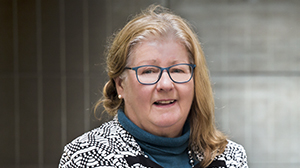- Future Students
- Current Students
- Faculty
- Staff
- Alumni
- Others
Organizations looking to stop violence against women face challenges

We need to have sustainable organizations that can really delve into their work."
Funding for agencies delivering programs for women who have experienced violence has changed significantly over the last 25 years in Ontario and this is related to the narrative regarding how gender inequality issues are handled.
Organizations must be strategic to remain viable, says University of Guelph-Humber instructor Dr. Lisa Boucher.
Dr. Boucher, who teaches “Trends in Gender Issues” at UofGH, will deliver a talk titled “Violence Against Women: Exploring Connections Between Community and Policy Responses,” for staff, faculty and students on Friday, Feb. 16 from 11 a.m. to 1 p.m. in GH 424. The lecture is organized by Academic Services.
“Since 1990, funds have been consistently available for anti-violence organizations (in Ontario), however the nature of these funds have shifted,” Dr. Boucher explained.
“In the past for instance, organizations would receive core funding to cover: organizational costs, programming, services and advocacy. More and more funding now has changed to project-based, which means they (agencies) will get a specific pocket of money directed at particular initiatives.”
The government’s strategy of distributing money offers interesting insights into the province’s priorities as well as broader changes happening within the political environment. There’s now a business approach to funding social services, Dr. Boucher noted.
Allocating money for projects can spur innovation, allow organizations to assess community needs and create tailor-made programs, however, under the current model organizations must scramble to find money to fund their initiatives, Dr. Boucher said.
“We need to have sustainable organizations that can really delve into their work without having a significant amount of time and resources going towards applying for funding or maintaining the current funding,” she said when asked about the current challenges agencies face.
“They (agencies) need to be able to focus on the issues and the communities they are trying to provide service for and not just the day-to-day work.”
The details on the funding climate are part of Dr. Boucher’s ongoing research, “Changing state priorities and violence against women” which is funded by UofGH’s Research Grant Fund. The project examines funding for feminist anti-violence work over a 25 year period (1990-2015) in Ontario. Using a policy analysis, the study considers how state funding priorities and anti-violence legislation shape potential opportunities or constraints for feminist service organizations engaged in anti-violence work.
The project, which was started in April 2017, is expected to be finished in the summer.







